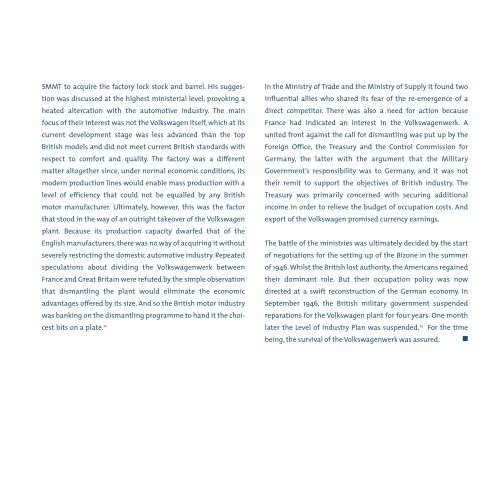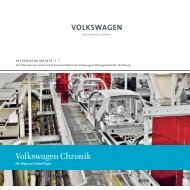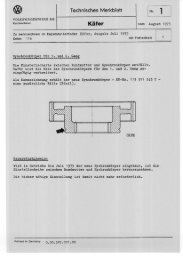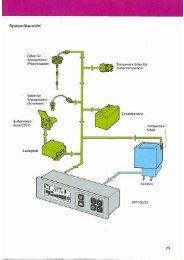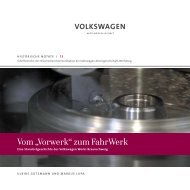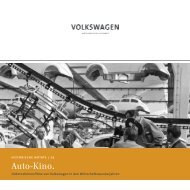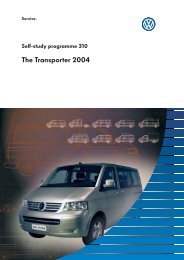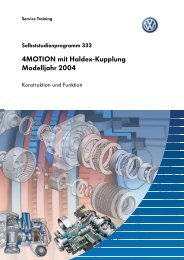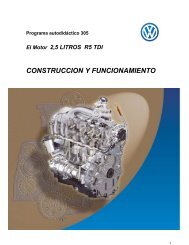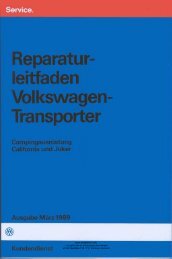HN 2: The British and their Works
HN 2: The British and their Works
HN 2: The British and their Works
You also want an ePaper? Increase the reach of your titles
YUMPU automatically turns print PDFs into web optimized ePapers that Google loves.
SMMT to acquire the factory lock stock <strong>and</strong> barrel. His suggestion<br />
was discussed at the highest ministerial level, provoking a<br />
heated altercation with the automotive industry. <strong>The</strong> main<br />
focus of <strong>their</strong> interest was not the Volkswagen itself, which at its<br />
current development stage was less advanced than the top<br />
<strong>British</strong> models <strong>and</strong> did not meet current <strong>British</strong> st<strong>and</strong>ards with<br />
respect to comfort <strong>and</strong> quality. <strong>The</strong> factory was a different<br />
matter altogether since, under normal economic conditions, its<br />
modern production lines would enable mass production with a<br />
level of efficiency that could not be equalled by any <strong>British</strong><br />
motor manufacturer. Ultimately, however, this was the factor<br />
that stood in the way of an outright takeover of the Volkswagen<br />
plant. Because its production capacity dwarfed that of the<br />
English manufacturers, there was no way of acquiring it without<br />
severely restricting the domestic automotive industry. Repeated<br />
speculations about dividing the Volkswagenwerk between<br />
France <strong>and</strong> Great Britain were refuted by the simple observation<br />
that dismantling the plant would eliminate the economic<br />
advantages offered by its size. And so the <strong>British</strong> motor industry<br />
was banking on the dismantling programme to h<strong>and</strong> it the choicest<br />
bits on a plate. 22<br />
In the Ministry of Trade <strong>and</strong> the Ministry of Supply it found two<br />
influential allies who shared its fear of the re-emergence of a<br />
direct competitor. <strong>The</strong>re was also a need for action because<br />
France had indicated an interest in the Volkswagenwerk. A<br />
united front against the call for dismantling was put up by the<br />
Foreign Office, the Treasury <strong>and</strong> the Control Commission for<br />
Germany, the latter with the argument that the Military<br />
Government’s responsibility was to Germany, <strong>and</strong> it was not<br />
<strong>their</strong> remit to support the objectives of <strong>British</strong> industry. <strong>The</strong><br />
Treasury was primarily concerned with securing additional<br />
income in order to relieve the budget of occupation costs. And<br />
export of the Volkswagen promised currency earnings.<br />
<strong>The</strong> battle of the ministries was ultimately decided by the start<br />
of negotiations for the setting up of the Bizone in the summer<br />
of 1946. Whilst the <strong>British</strong> lost authority, the Americans regained<br />
<strong>their</strong> dominant role. But <strong>their</strong> occupation policy was now<br />
directed at a swift reconstruction of the German economy. In<br />
September 1946, the <strong>British</strong> military government suspended<br />
reparations for the Volkswagen plant for four years. One month<br />
later the Level of Industry Plan was suspended. 23 For the time<br />
being, the survival of the Volkswagenwerk was assured. ■


